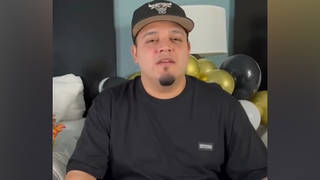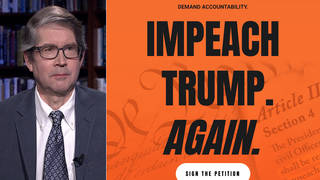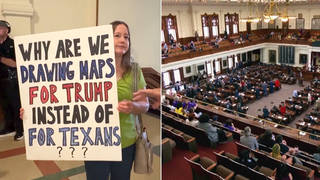
Guests
- John Bonifazco-founder and president of Free Speech for People and co-author of The Constitution Demands It: The Case for the Impeachment of Donald Trump. Bonifaz is also a practicing constitutional attorney.
For just the third time in history, the U.S. Senate has opened a trial to determine if a sitting president should be removed from office. The Senate trial comes a month after the House impeached President Trump for pressuring Ukraine to investigate his political rival Joe Biden. Supreme Court Chief Justice John Roberts, who will preside over the impeachment trial in the Senate, later swore in senators who will serve as jurors when the trial officially begins on Tuesday. This comes as more information is coming to light about the actions of President Trump and his associates. On Thursday, the nonpartisan Government Accountability Office said the White House Office of Management and Budget violated federal law by withholding $400 million in aid money to Ukraine even though the funds had been allocated by Congress. We speak with attorney John Bonifaz, co-founder and president of Free Speech for People and co-author of “The Constitution Demands It: The Case for the Impeachment of Donald Trump.”
Transcript
AMY GOODMAN: For just the third time in history, the U.S. Senate has opened a trial to determine if a sitting president should be removed from office. The Senate trial comes a month after the House impeached President Trump for pressuring Ukraine to investigate his political rival Joe Biden. On Thursday, Congressman Adam Schiff, one of seven House impeachment managers, addressed the Senate.
REP. ADAM SCHIFF: Donald J. Trump has abused the powers of the presidency in that using the powers of his high office, President Trump solicited the interference of a foreign government, Ukraine, in the 2020 United States presidential election. … President Trump, by such conduct, has demonstrated that he will remain a threat to the Constitution if allowed to remain in office, and has acted in a manner grossly incompatible with self-governance and the rule of law. President Trump thus warrants impeachment and trial, removal from office and disqualification to hold and enjoy any office of honor, trust or profit under the United States.
AMY GOODMAN: Supreme Court Chief Justice John Roberts, who will preside over the impeachment trial in the Senate, later swore in senators who will serve as jurors when the trial officially begins on Tuesday.
CHIEF JUSTICE JOHN ROBERTS: At this time, I will administer the oath to all senators in the chamber in conformance with Article I, Section 3, Clause 6 of the Constitution and the Senate’s impeachment rules. Will all senators now stand or remain standing and raise their right hand? Do you solemnly swear that in all things appertaining to the trial of the impeachment of Donald John Trump, president of the United States, now pending, you will do impartial justice according to the Constitution and laws, so help you God?
SENATORS: I do.
AMY GOODMAN: After that, each senator stepped up and signed the oath book.
While the impeachment trial is beginning in the Senate, more information is coming to light about the actions of President Trump and his associates. On Thursday, the nonpartisan Government Accountability Office said the White House Office of Management and Budget violated federal law; they broke the law by withholding $400 million in aid money to Ukraine even though the funds had been allocated by Congress. The GAO wrote, quote, “Faithful execution of the law does not permit the President to substitute his own policy priorities for those that Congress has enacted into law,” unquote.
Meanwhile, pressure is growing on Senate Majority Leader Mitch McConnell to allow witnesses to testify during the Senate trial. On Thursday, Republican Senator Susan Collins of Maine said it’s likely she would support a motion to call witnesses, just as she did in 1999 during President Clinton’s impeachment trial. One potential witness is Lev Parnas, a Soviet-born businessman and former associate of Trump’s lawyer Rudy Giuliani, who said this week, in a series of interviews, the president was fully aware of efforts to pressure Ukraine to investigate Joe Biden. Parnas is under federal indictment.
To talk more about the impeachment trial, we go to Massachusetts to speak with attorney John Bonifaz, co-founder and president of Free Speech for People, co-author of The Constitution Demands It: The Case for the Impeachment of Donald Trump.
John, you have been calling for this for several years. Talk about the significance of what we have witnessed over the past few days, the whole ceremony about the Senate impeachment trial, and what’s about to happen.
JOHN BONIFAZ: Well, thank you, Amy, for having me.
This is a serious moment for our nation. Our democracy and our Constitution are on the line. And what we’ve seen over these past few days is that this is a very solemn occasion. The Senate must now take up these serious charges against this president issued by the House of Representatives, and they must conduct a full and fair trial. And the very fact that you have the chief justice of the United States, who only presides over the Senate for an impeachment trial — and the third time in our history this is happening — both take the oath to do impartial justice but then also administer that oath for every United States senator, and then each one signs the oath book, they all have taken now that oath, a separate oath from the one they took when they assumed the office at the United States Senate to defend and protect our Constitution. And so, each and every senator now must comply with that oath and must conduct a full and fair trial, hearing witnesses, demanding the documents, and not engaging in the cover-up that this president has engaged in so far to try to protect himself and his associates.
AMY GOODMAN: Now, talk about what he’s on trial for, and explain what it means if he were found guilty. Does that mean automatic removal from office?
JOHN BONIFAZ: The president is on trial for abuse of power and abuse of the public trust. These are precisely the kinds of charges that the framers envisioned when they placed the impeachment clause in the Constitution: crimes against the state. And these abuses of power come out of the Ukraine scandal, where this president illegally solicited foreign assistance from the Ukrainian government to assist his re-election campaign. And he engaged in extortion and bribery in the process, misusing nearly $400 million of U.S. funds, to try to hold back those funds from the Ukrainian government to get what he wanted, which was the announcement of an investigation against a political rival, Joe Biden, and his son, Hunter Biden. And, you know, this is the kind of misuse of the office that the framers feared. And the idea that we would have a president who would so engage in that kind of abuse of office, in violation of the oath of office to defend and protect the Constitution, means that he must now face this trial. And the House was right to issue these articles of impeachment.
You’re right, Amy, that we at Free Speech for People have been calling for accountability for this president’s abuses of power since the moment he took the oath of office, violating the foreign and domestic emoluments clauses and treating the Oval Office as a profit-making enterprise at the public expense. And he’s repeatedly abused his power since that time. But I think what we now see is a president who must face a trial. And yes, if he is removed by the Senate, there is no further appeal. The Senate has the sole power to engage in this impeachment trial and removal. And he will be removed from the office if the Senate votes to convict.
AMY GOODMAN: So let’s talk about the issue of witnesses — it looks like up to five Republican senators are weighing whether to call for witnesses — and what exactly this means.
JOHN BONIFAZ: Well, as we know, every trial requires witness testimony. You know, what the House has done is effectively an indictment against the president, and that indictment now must be heard in the United States Senate with a full and fair trial. And these witnesses must be brought forward. In the Johnson impeachment trial, there were 41 witnesses that were heard. There were three witnesses heard in the Clinton impeachment trial, but then many other witnesses had been deposed during the Ken Starr investigation.
Here what we have is a Senate majority leader, Mitch McConnell, claiming that there shall be no witnesses, that somehow we don’t need any evidence to be heard in the U.S. Senate. But what’s appeared to happen over the past several days is that a number of Republican senators are breaking away from Mitch McConnell. We’ll see when the vote finally occurs on this question. But if 51 senators, which would be at least four Republican senators joining the 47 Democratic senators, vote to have witnesses, then there will be witnesses. And some of these witnesses have yet to come forward because they’ve been part of this cover-up this president has required: Mick Mulvaney, the chief of staff for the White House; John Bolton, the national security — former national security adviser; Lev Parnas, certainly, the associate who has now come forward talking about how the president knew all about this scheme. So, these witnesses need to become brought forward, as well as the documents that the White House has withheld under the president’s direction. The senators cannot be complicit in this cover-up.
AMY GOODMAN: Let’s go to Lev Parnas, the Soviet-born businessman, former associate of Trump’s lawyer Rudy Giuliani, now under federal indictment, speaking to MSNBC’s Rachel Maddow.
LEV PARNAS: See, this was the whole key. They would constantly — every time somebody would meet Zelensky, they would, like, agree, and then they would walk it back. So, they announced something about corruption, that he’s going to be on a corruption, but that Giuliani blew his lid on that, saying, “That’s not what we discussed,” that it wasn’t supposed to be a corruption announcement. It has to be about Joe Biden and Hunter Biden and Burisma.
RACHEL MADDOW: He said the name Biden needs to be spoken, was his insistence?
LEV PARNAS: Always, always.
AMY GOODMAN: So, Lev Parnas emphatically says the president knew, and he was in on conversations with the president about this, but he is under federal indictment. If Nancy Pelosi, the House speaker, had not held off on handing over the articles of impeachment, would this have been included? And then, what about people like Republican Senator Susan Collins saying, “This all should have been dealt with in the House. We’re not going to deal with this”?
JOHN BONIFAZ: Well, first, we know that Senator Mitch McConnell said, right at the time that the House voted on the articles of impeachment in December, that he was working directly with the White House, in coordination 100%, and that he was therefore going to not allow for any witnesses and force a quick dismissal of these charges in the Senate. So, yes, Speaker Pelosi was correct to hold back those articles until there was some understanding of what could happen. And once some of these senators came forward and said they would like to hear from witnesses, then it became clear that Senator McConnell would not necessarily be able to control these proceedings entirely and get a quick dismissal. He’s already now said that, in fact, there’s not an appetite for quick dismissal in the Senate, despite some senators trying to advocate for that.
So I do think that we’re going to hear opening arguments next week, and then there will be this crucial vote on whether there are witnesses. But as for Senator Collins’s claim, it’s completely specious. I mean, what we, again, have from the House is an indictment, but that does not mean that further witnesses that come forward, further documents that come forward, shall not be heard by the United States Senate. And this is, again, directly related to the oath that she and every other senator has taken to do impartial justice. They must not be complicit with this cover-up and with a criminal enterprise operating out of the Oval Office. They must conduct themselves according to that oath.
AMY GOODMAN: John Bonifaz, I want to thank you for being with us, co-founder and president of Free Speech for People, co-author of The Constitution Demands It: The Case for the Impeachment of Donald Trump.
When we come back, we turn to Honduras, where at least 15 women have been murdered in the first two weeks of this year. We’ll look at the case of Berta Cáceres and the men who have been imprisoned for her murder. Stay with us.












Media Options